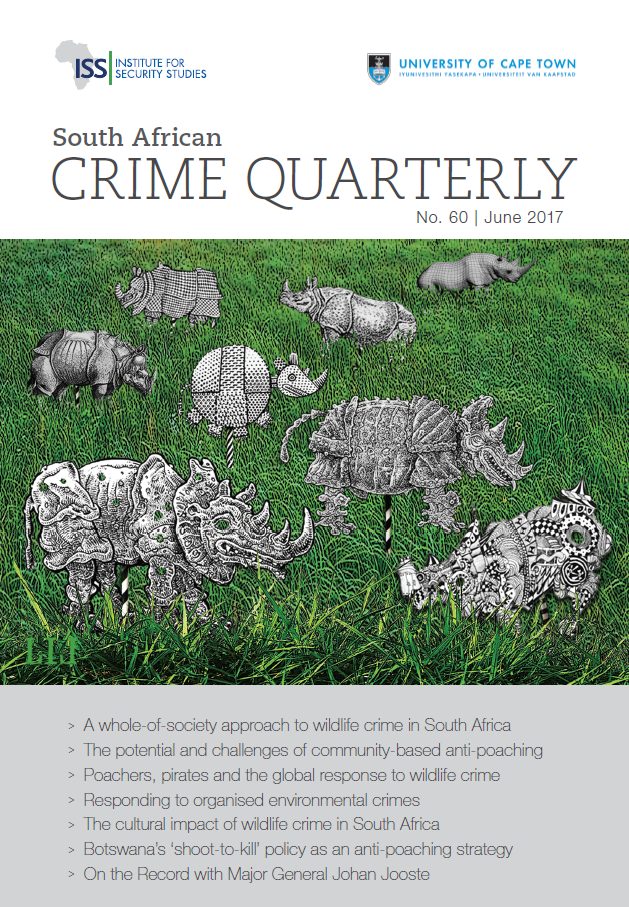Organized environmental crimes: Trends, theory, impact and responses
DOI:
https://doi.org/10.17159/2413-3108/2017/i60a2770Abstract
Once considered peripheral and a green matter, wildlife crimes have moved up global security and policy agendas. The UN General Assembly, for example, adopted two resolutions to tackle wildlife crimes in 2015 and 2016. Meanwhile the South Africa and the Southern African Development (SADC) have declared wildlife trafficking a priority crime issue. Rhino poaching, in particular, has captured the attention of the public, international community and our national government. Less charismatic plant and wildlife species are also harvested and trafficked across the globe. The lesser-known pangolin is considered the most trafficked species while cycads constitute the most threatened plant species on the planet. The illegal or irregular extraction of natural resources, logging, mining, overfishing, trafficking of toxic, nuclear or electronic waste, and industrial dumping have all become areas of concern.
Downloads
References
World Bank. 2016. Poverty and Shared Prosperity 2016: Taking on Inequality. Washington, DC: World Bank. doi:10.1596/978-1-4648-0958-3. License: Creative Commons Attribution CC BY 3.0 IGO
Pablo Fajnzylber , Daniel Lederman , and Norman Loayza 2002. "Inequality and Violent Crime," The Journal of Law and Economics 45, no. 1, pp.1-39.https://doi.org/10.1086/338347
Statistics South Africa, 2017. Statistical release P0211 Quarterly Labour Force Survey Quarter 1: 2017. Available at: http://www.statssa.gov.za/publications/P0211/P02111stQuarter2017.pdf (accessed 2 June 2017)
Maano Ramutsindela 2016. "Wildlife Crime and State Security in
South(Ern) Africa: An Overview of Developments." Politikon , pp. 1-13. Lunstrum, Elizabeth 2015. "Green Grabs, Land Grabs and the Spatiality of Displacement: Eviction from Mozambique's Limpopo National Park." Area 48, no. 2, pp. 142-52.
Maria Hauck, M., and N. A. Sweijd 1999. “A Case Study of Abalone Poaching in South Africa and its Impact on Fisheries Management.” ICES Journal of Marine Science 56, no, 6, pp. 1024–1032. Annette Hübschle 2016. "The Social Economy of Rhino Poaching: Of Economic Freedom Fighters, Professional Hunters and Marginalized Local People." Current Sociology 65, no. 3,pp 427-447.
Tom Maguire and Cathy Haenlein 2015. "An Illusion of Complicity: Terrorism and the Illegal Ivory Trade in East Africa." London: Royal United Services Institute. Environmental Humanities South, Seminar “Saving the Saviours? Confronting Conservation's Underbellies” with Maano Ramutsindela, Frank Matose and Bram Büscher, 2 June 2017
Richard H. Emslie, Tom Milliken, Bibhab Talukdar, Susie Ellis, Keryn Adcock, and Michael H. Knight 2016. "African and Asian Rhinoceroses – Status, Conservation and Trade: A Report from the IUCN Species Survival Commission (Iucn Ssc) African and Asian Rhino Specialist Groups and Traffic to the Cites Secretariat Pursuant to Resolution Conf. 9.14 (Rev. Cop15)." Geneva: CITES Secretariat, p.1.
Tileni Mongudhi, Joel Konpono, and Ntibinyane Ntibinyane. 9 March 2016. "Deadly Borders…30 Namibians Killed through Botswana’s Shoot-to-Kill Policy." The Namibian. Survival International 2016. "Botswana: Helicopter Crashes after Shooting at Bushmen." news release.
Downloads
Published
Issue
Section
License
Copyright (c) 2017 Author and Institute for Security Studies

This work is licensed under a Creative Commons Attribution 4.0 International License.
SACQ is licenced under a creative commons licence (CC BY) that allows others to distribute, remix, tweak, and build upon your work, even commercially, as long a they give appropriate credit, provide a link to the license, and indicate if changes were made. They may do so in any reasonable manner, but not in any way that suggests the licensor endorses you or your use.
Copyright for articles published is vested equally between the author/s, the Institute for Security Studies and the Centre of Criminology (UCT).




.png)